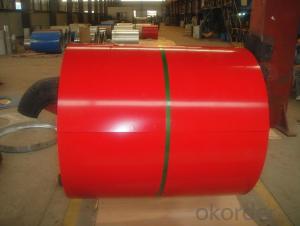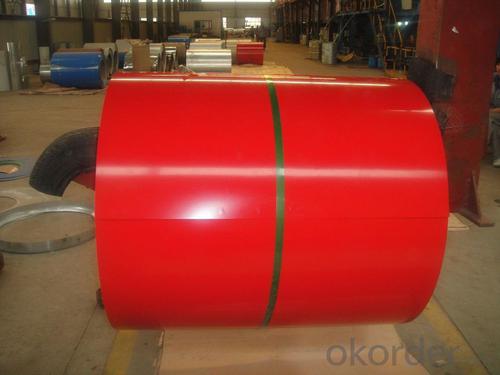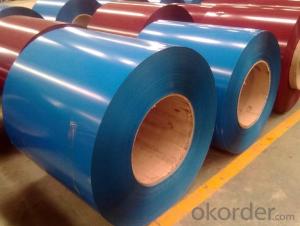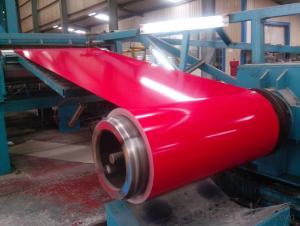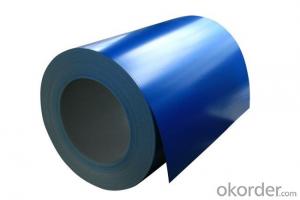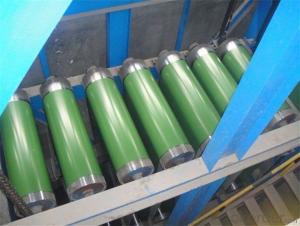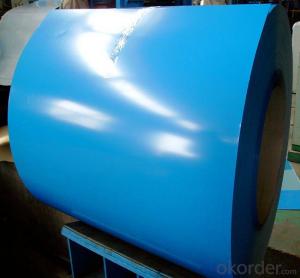Prepainted Aluminum Zinc Rolled coil for construction
- Loading Port:
- Shanghai
- Payment Terms:
- TT OR LC
- Min Order Qty:
- 25 m.t.
- Supply Capability:
- 30000 m.t./month
OKorder Service Pledge
OKorder Financial Service
You Might Also Like
Structure of Aluminum Zinc Rolled Coil
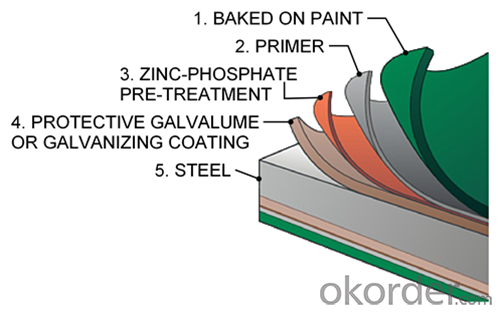
Description of Aluminum Zinc Rolled Coil
Aluminum zinc coils is a kind of coated steel coil/sheet. With the cold rolled steel of different strength and thickness as substrate, it is produced through applying Al-Zn coat on both faces by hot dip process. In its coating, Al accounts for about 55%, Si 1.6%, while the remaining is Zn. Aluminum zinc coils enjoys both the physical protective feature and durability of Al and the electrochemical protective property of Zn. And its surface has bright silver color and regular embossed-like figure, which are highly decorative.
Main Feature of Aluminum Zinc Rolled Coil for Construction Roof
1.Corrosion resistance: It mainly depends on the aluminum protection. When the zinc being worn, the aluminum will form a dense layer of aluminum oxide, resist corrosion material to prevent further corrosion inside.
2. Heat resistance: Aluminum zinc alloy steel sheet has excellent heat resistance, can withstand high temperatures over 300 centigrade, and is similar with aluminized steel high temperature oxidation resistance. It often used in chimney pipes, ovens, fluorescent lighting device and the device cover.
3. Heat reflective: Galvanized steel plate heat-reflective high rate is twice as galvanized steel, often used to make insulation materials.
4. Economy: Because density of 55% AL-Zn is smaller than the density of Zn, so in the same weight and thickness of Galvanized zinc layer, aluminum-zinc steel plate is larger area more than 3% of galvanized steel sheet.
Applications of Aluminum Zinc Rolled Coil for Construction Roof
1. Construction and building: roofing; ventilating duct; handrail; partition panel;etc.
2. Electric appliance: refrigerator; washing machine; refrigerator; DVD;etc.
3.Transportation: oil tank; road sign; etc.
4.Agriculture:barn; etc.
5.Others:vending machine; game machine; etc.
Specifications of Prepainted Aluminum Zinc Rolled Coil for Construction
Chemical Composition | ||||||
GRADE | C | Si | Mn | P | S | Ti |
SGCC/DX51D+Z | ≤0.10 | ≤0.50 | ≤0.60 | ≤0.10 | ≤0.030 | ≤0.020 |
DX52D+Z | ≤0.10 | ≤0.50 | ≤0.60 | ≤0.10 | ≤0.030 | ≤0.020 |
SGCD/DX53D+Z | ≤0.10 | ≤0.30 | ≤0.50 | ≤0.05 | ≤0.030 | ≤0.020 |
SGCE/DX54D+Z | ≤0.10 | ≤0.30 | ≤0.30 | ≤0.03 | ≤0.020 | ≤0.020 |
DX56D+Z | ≤0.10 | ≤0.30 | ≤0.30 | ≤0.03 | ≤0.020 | ≤0.020 |
Structural | ≤0.20 | ≤0.60 | ≤1.70 | ≤0.10 | ≤0.045 | |
Mechanical Properties | ||||||
GRADE | Yield Strength MPa | Tensile Strength MPa | Elongation % | |||
SGCC(DX51D+Z) | ≥205 | ≥270 | - | |||
SGCD(DX53D+Z) | - | ≥270 | 38 | |||
SGCE(DX54D+Z) | - | ≥270 | 40 | |||
DX56D+Z | - | ≥270 | 42 | |||
FAQ of Prepainted Aluminum Zinc Rolled Coil for Construction
We have organized several common questions for our clients,may help you sincerely:
1. What is the minimum order quantity ?
Our MOQ is 50mt for each size. And we will consider to give more discount if you make big order like 1000 tons and more. Further more, the more appropriate payment term your offer the better price we can provide.
2. How long can we receive the product after purchase?
Usually within thirty working days after receiving buyer’s advance payment or LC. We will arrange the factory manufacturing as soon as possible. The cargo readiness usually takes 15-25 days, but the shipment will depend on the vessel situation.
3. How to guarantee the quality of the products?
We have established the international advanced quality management system,every link from raw material to final product we have strict quality test;We resolutely put an end to unqualified products flowing into the market. At the same time, we will provide necessary follow-up service assurance.
- Q: Can't find it- this is for a physics experiment for youngs modulus done with a steel wire.
- Elastic Limit Of Steel
- Q: How are steel coils used in the production of storage containers?
- Steel coils are commonly used in the production of storage containers as they provide the strong and durable material required to withstand heavy loads and protect the stored items. These coils are cut, shaped, and welded to form the structure of the container, ensuring its strength and stability. Additionally, the steel coils can be coated or painted to enhance their corrosion resistance and improve the container's lifespan.
- Q: How are steel coils tested for quality?
- Steel coils are tested for quality through a variety of methods including visual inspection, dimensional measurements, chemical composition analysis, and mechanical testing. These tests ensure that the steel coils meet the required standards for strength, durability, and other performance parameters.
- Q: How are steel coils used in construction?
- Steel coils are commonly used in construction for a variety of purposes, such as forming the structural framework of buildings, manufacturing steel beams, and reinforcing concrete structures. The coils are unraveled and shaped into different forms, allowing them to provide strength, stability, and durability to the construction projects.
- Q: Can steel coils be coated with holographic patterns?
- Yes, steel coils can be coated with holographic patterns. This process involves the application of a holographic film or coating onto the surface of the steel coils, creating a visually appealing and unique holographic effect. This coating can be used for various purposes such as branding, security, or aesthetics in industries like automotive, packaging, or electronics.
- Q: I want to save water $$, so I want to use frozen steel to cool my coke. possible or no?
- can't freeze it but ya can make it very cold
- Q: what is the densest type of steel ? what is its density ?what is its tensile strength .
- The density of steels ranges from about 7.7 to a bit over 8.0 g/cm^3, depending on the specific type. Some of the tool steels (a group that contains alloying elements such as cobalt, molybdenum, and tungsten) and some of the stainless steels tend to be the most dense. Steels are a very large family of alloys, having in common that iron is the principal ingredient (They are iron-based, and ALL steels are mostly iron, by definition. Nickel-based superalloys such as inconel and hastelloy are therefore not steels). There are other elements present in steel - usually carbon, at a minimum. The range of carbon content for ordinary steels runs from a trace (~.1% or so) up to a maximum of 2%, theoretically, though actual carbon contents above 1% are fairly rare. Many other elements may be added to produce various types of steels having specific properties. In corrosion-resistant steels, carbon is usually present in only minute quantities, with chromium (400 series) or chromium plus nickel (300 series) being the major alloying additions. In the 400 series grades that can be hardened by heat treatment, hardening is accomplished though the combined effects of the carbon and chromium. The 300 series alloys can be hardened (and strengthened) only through cold working (strain hardening). Density has no direct relationship to tensile strength, BTW.
- Q: How are steel coils inspected for flatness?
- Steel coils are inspected for flatness using various methods, such as visual inspection, measuring the crown or center buckle, and conducting a straight edge test. These techniques help assess any deviations or unevenness in the coil's surface, ensuring that it meets the required flatness standards.
- Q: How are steel coils used in the production of metal signage?
- The production of metal signage relies heavily on steel coils, which are indispensable components. These coils are typically crafted from top-notch steel and are available in various dimensions and widths. By utilizing steel coils, manufacturers can achieve efficient and cost-effective production methods. To commence the process, the steel coils are unraveled and fed into a machine known as a roll former or a metal press. This machine molds the steel into the desired shape and design for the signage. The malleability and moldability of the coils make them perfect for creating intricate and personalized signage designs. Once the steel has been shaped, it can undergo several treatments to enhance its appearance and durability. For instance, a layer of paint or powder coating can be applied to protect the steel from corrosion and provide an aesthetically pleasing finish. This protective coating can also be tailored to meet specific branding or design requirements. After the steel has been shaped and coated, it can undergo further processing to add features such as embossing or perforations. These additional details can amplify the overall visual appeal of the metal signage and make it truly stand out. Moreover, steel coils possess exceptional structural integrity, ensuring that the metal signage remains robust and long-lasting, even in harsh environmental conditions. This durability is particularly crucial for outdoor signage that needs to endure exposure to weather elements such as rain, wind, and sunlight. In conclusion, steel coils are indispensable in the production of metal signage. Their versatility, durability, and ease of manipulation make them the ideal material for creating customized designs. Whether the signage is intended for indoor or outdoor use, steel coils provide the necessary strength and aesthetic appeal needed for high-quality metal signage.
- Q: i heard steel type is good and i don't have any i have defeated all the trainers up to the icicle badge (i have got the icicle badge but not the one after) where can i get one?
- you can get a steelix at the cave just before the elite four. but if you have wifi, you can trade for one.
Send your message to us
Prepainted Aluminum Zinc Rolled coil for construction
- Loading Port:
- Shanghai
- Payment Terms:
- TT OR LC
- Min Order Qty:
- 25 m.t.
- Supply Capability:
- 30000 m.t./month
OKorder Service Pledge
OKorder Financial Service
Similar products
Hot products
Hot Searches
Related keywords
